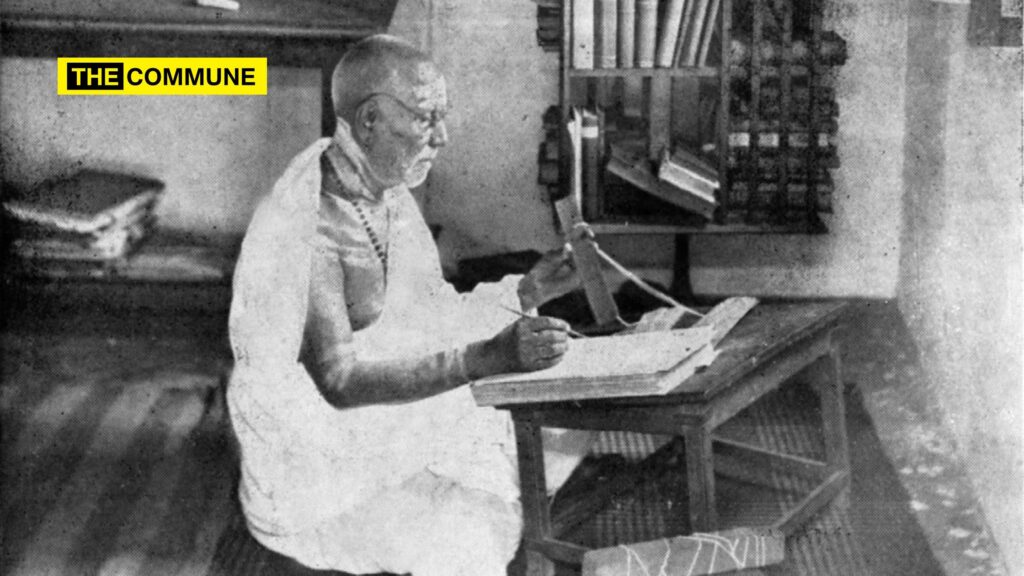A few months ago, Dravidianists were sharing memes, cartoons, and caricatures claiming that knowledge of Sanskrit was a requirement for securing a medical seat in Tamil Nadu.
There is no such thing called Western education. The education is given by Tamil people by Tamilnadu Government. manusmriti Gurukul education system is not Indian. You want to pour molten lead on all non brahmins try to learn. Sanskrit Kept as eligibility for medicine in TN by U pic.twitter.com/sDv6L2DRDL
— Humanity above Nation! (@gdelango) February 27, 2021
Here, I bust this Dravidian lie.
Medical education in Madras Presidency in Tamil (vernacular language) was made possible with significant efforts of Vaidyaratna Dr G Srinivasamurti. His expertise was lauded by both Indian and Western medical practitioners, as he presented a scientific approach to the indigenous medicine system to the then government.
Dr. G Srinivasamurti was secretary of the Usman Committee set up in the Madras Presidency in the first regime under diarchy rule. Based on its recommendation, Indian medical schools and hospitals were started in 1925. The school had three sections – Ayurveda, Siddha, and Unani.
Going back further in history under British rule, education in India was neglected for a considerable period. Macaulay’s minute on Indian education paved the way for introducing Western education to India with English as a medium of instruction.
To serve the British Empire’s military, medical education was institutionalised, with the establishment of a medical school in 1835. The colonial state was apathetic to indigenous medical practitioners.
Members of Madras LC moved resolutions (Narasimha Ayyar in 1913 & 1916, AS Krishna Rao Pantulu in 1914, 1915 & 1917, TR Ramachandra Ayyar in 1920) for the development of indigenous medicines for betterment of the health of the local population. (Incidentally, one of Justice Party founders, TM Nair, a practitioner of Western medicine resisted this while AS Krishna Rao proposed a resolution in 1915).
The colonial government had first appointed Dr MC Koman (another Western medicine practitioner) Committee, which failed with severe criticism from practitioners of indigenous medicines and native newspapers.
1918 and 1920 Congress resolutions also called for the establishment of an indigenous medical system. With the Swadeshi and Swaraj movements, there were growing demands for indigenous medical treatment by educated and politically active Indians.
All of these events, culminated in 1921 with Madras Presidency appointing Usman committee with Mohd. Usman as chairman and G Srinivasamurti as secretary. Dr Srinivasamurti’s work is considered a magnum opus of the science and art of Indian medicine.
The committee recommended the government immediately establish colleges & schools, hospitals & dispensaries for Indian systems of medicine. Vernacular to be the medium of instruction in all lower grades; in higher grades, it was left to be settled by teaching staff.
After much debate, a government-funded School of Indian Medicine in Madras was formally sanctioned, with three sections in Ayurveda, Siddha, and Unani. The School of Indian Medicine was thus founded in 1925 in Kilpauk with Dr. Srinivasa Murthy as its first Principal and in charge of the hospital attached to it. After careful study and practice, he evolved a system containing the best of both Ayurveda and Allopathy and named it an integral system. He stood for all that is best in any system. He is also the founder President of IMPCOPS.
As regards K A P Viswanathan Pillai’s statement “they removed the need to know Sanskrit to be eligible for medical degree”, there is no such evidence found to substantiate such a claim. This is one of the many Dravidian lies that was spread to castigate Brahmins in the state.
In fact, proof of the outcome of Dr G. Srinivasamurti’s work lies in the government publication shown below confirms the school being able to teach medical education in Tamil, Telugu, or Urdu.
The contributions of Vaidyaratna Captain G Srinivasamurti were recognised during the college’s silver jubilee celebrations. The event was presided over by the first CM of TN, PS Kumaraswami Raja. His bronze statue was unveiled by Sir CP Ramaswamy Iyer and his speech during the unveiling as given below.
(This article based on the X thread by Baskar – all images are from the same thread)
Baskar is a finance professional having keen interest in current affairs and Indian culture.
Subscribe to our channels on Telegram, WhatsApp, and Instagram and get the best stories of the day delivered to you personally.

